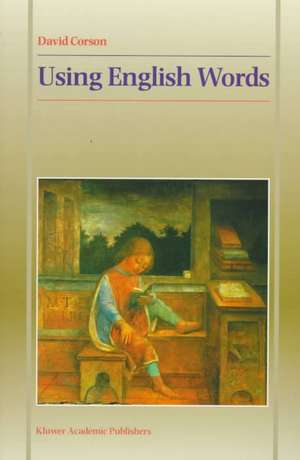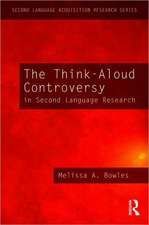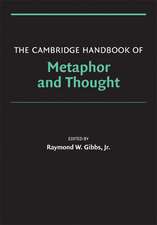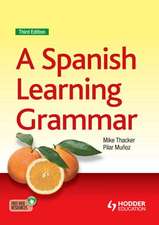Using English Words
Autor P. Corsonen Limba Engleză Paperback – 31 mar 1996
Preț: 468.25 lei
Preț vechi: 550.88 lei
-15% Nou
Puncte Express: 702
Preț estimativ în valută:
89.61€ • 93.21$ • 73.98£
89.61€ • 93.21$ • 73.98£
Carte tipărită la comandă
Livrare economică 15-29 aprilie
Preluare comenzi: 021 569.72.76
Specificații
ISBN-13: 9780792337119
ISBN-10: 0792337115
Pagini: 226
Ilustrații: VIII, 226 p.
Dimensiuni: 160 x 240 x 13 mm
Greutate: 0.34 kg
Ediția:1995
Editura: SPRINGER NETHERLANDS
Colecția Springer
Locul publicării:Dordrecht, Netherlands
ISBN-10: 0792337115
Pagini: 226
Ilustrații: VIII, 226 p.
Dimensiuni: 160 x 240 x 13 mm
Greutate: 0.34 kg
Ediția:1995
Editura: SPRINGER NETHERLANDS
Colecția Springer
Locul publicării:Dordrecht, Netherlands
Public țintă
ResearchCuprins
1: The Place of Words in Discourse and in Education.- Discursive Psychology and the Discursive Mind.- Words in Education.- The Sociology of Language.- Words, the Sociology of Language, and Education.- Conclusion.- 2: A Multidisciplinary Review: Words, Culture, Education, and Society.- Insights from the Philosophy of Language.- Insights from Linguistics and from Studies of Literacy.- Insights from the Sociology of Language and Education.- Insights from Psychology and Cognitive Studies of Literacy.- Insights from Anthropology: Cultural Meaning Systems.- Insights from Language in Education.- Insights from Languages other than English.- Conclusion.- 3: The Historical Development of the Lexical Bar.- Before the Renaissance Period.- The Renaissance Period.- Into the Early Modern Period.- The Nineteenth Century.- A Modern Lexical Bar for English-Speaking Countries.- Conclusion.- 4: Factors Reinforcing the Bar in the Present Day.- Morphological and Phonological Factors.- The Formality and Pseudo-Prestige of G-L Words.- The Genuine Communicative Value of G-L Words.- Sociological and Intrapersonal Factors.- Conclusion.- 5: The Research Studies.- Measuring Instruments.- Research Contexts.- Research Findings: Passive Vocabulary.- Research Findings: Active Vocabulary.- Conclusion.- 6: Using Words in Educational Performance and for Sociocultural Reproduction.- Knowledge on Display.- Cultural Meaning Systems and the Lexical Bar.- High Status Cultural Capital, Formality, and Specialist G-L Words.- High Status Linguistic Capital and Sociocultural Reproduction.- Conclusion.- 7: Morphology and the Mental Lexicon.- Psycholinguistics and Discursive Psychology.- Seminal Studies of Morphology and the Mental Lexicon.- Orthographic Processing: Reading and Writing.- Phonological Processing: Speaking and Listening.- Evidence from Languages other than English.- Semantic Factors in Word Processing.- Experience in Word Learning and Use: Language Awareness.- Conclusion.- 8: Difficulty in Lexical Access: The Lexical Bar.- The Concrete-Abstract Continuum.- Low Imagery and Low Frequency.- Morphological Complexity.- The Role of Shape and Sound in Activating Words.- The Role of Meaning in Activating Words: Semantic Transparency.- Processing Difficulties: Patterns of Interference.- The Four Language Modes: Word Learning.- Conclusion: The Lexical Bar.- 9: Changing Practices: Further Research, Equity Matters, and Other Lexical Bars.- Words in English as a First Language.- Valuing Vocabulary Differences.- Words in English as a Second or Foreign Language.- Changing Practices: Oral Language and Literacy.- Equity Factors outside Language: Gender and Race.- Language Awareness and Learning Other Languages.- Are There Lexical Bars in Other Languages?.- Conclusion.- References.














